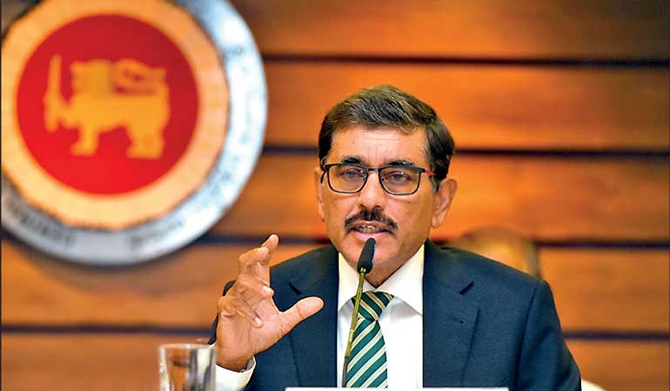Root cause of crisis, fiscal mismanagement - CBSL Chief

Inflation in Sri Lanka will peak at about 70% over the next two months before it starts to moderate in September this year, says governor of the Sri Lanka Central Bank (CBSL) - Dr. Nandalal Weerasinghe.
Eligible for EFF
Speaking to CNBC's “Street Signs Asia”, Dr. Weerasinghe said that the country is eligible for an “Extended Fund Facility” from the International Monetary Fund of $3 billion over three years.
The EFF was established to assist countries with serious payment imbalances.
According to government data, the National Consumer Price Index rose 45.3% year-on-year in May - a sharp spike compared to 33.8% in April. Food inflation also surged, jumping 58% year-on-year in May compared to 45.1% in April.
The CBSL Governor had stated that his calculations had factored an “adjustment” to higher energy prices.
Once the IMF begins dispensing money under what will be Sri Lanka’s 17th IMF program, other institutions such as the World Bank and the Asian Development Bank will supplement these funds by an additional $4 billion, according to the central bank governor.
Opportunity to learn from past mistakes
He said the current economic crisis is an opportunity for Sri Lankan authorities to learn from past mistakes and not reverse reforms once the IMF program ends.
“Once the [program] is over, we have seen authorities move back and reverse good policies,” he said.
“This is, to me, an opportunity for the… authorities to learn a lesson and move in the right direction, even beyond the IMF program. That is the key for us to manage this economy on a sustainable basis,” the central banker said.
Root cause - fiscal mismanagement
Conceding that while it is important to have a social safety net in place for the poor and disaffected, he said the root cause of the present economic crisis lies in decades of fiscal mismanagement.
″[The] government has been running large fiscal deficits for about 8% to 9% for long periods,” he said. “As a result we have… a very high level of public debt [which] has become unsustainable.”
Dr. Weerasinghe has also expressed optimism that reforms will be carried out under the new President Ranil Wickremesinghe, whom he describes as a “strong supporter” of economic reforms that had been involved in the negotiations with the IMF.
LoC with several countries
He has also predicted that the problem of low foreign exchange reserves will continue for the “next several months” until an agreement is reached with the IMF. He also said Sri Lanka is negotiating lines of credit with several friendly countries such as India, Japan, China and Bangladesh, among others.
Dismisses Chinese debt trap
However, he had dismissed reports that Sri Lanka had fallen into a “Chinese debt trap.”
China has funded large infrastructure development in Sri Lanka, extending loans over the past decade on terms often described as opaque by some observers. In an often cited example, Sri Lanka was forced to lease out its Hambantota port to a Chinese company for 99 years after failing to make repayments.
“I don’t agree with the concept…[of] getting trapped by China,” the banker said, adding that China has been “investing and helping” Sri Lanka over a long period of time. “That is why we have a certain amount of debt with China.”
He insisted those projects were “very good” and have “huge potential.”
